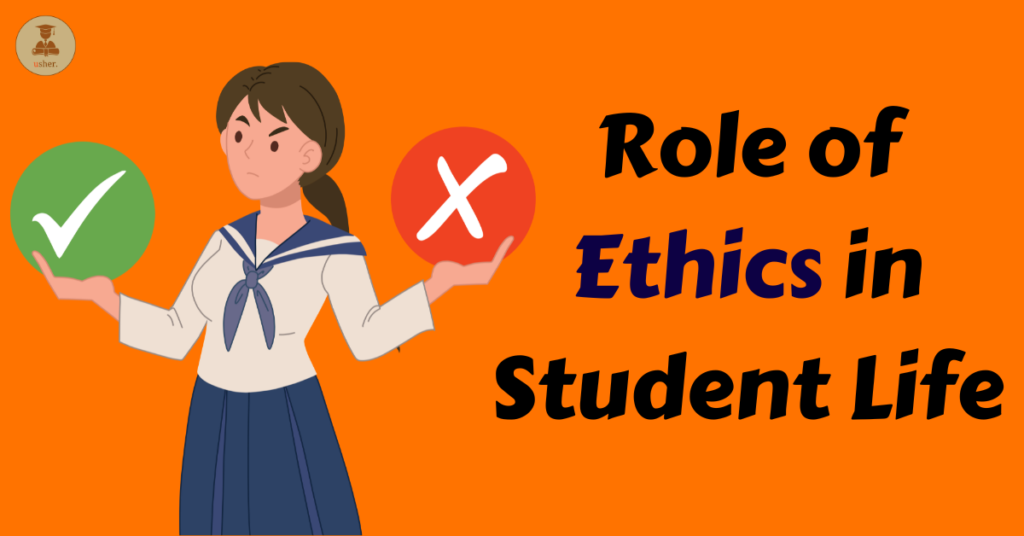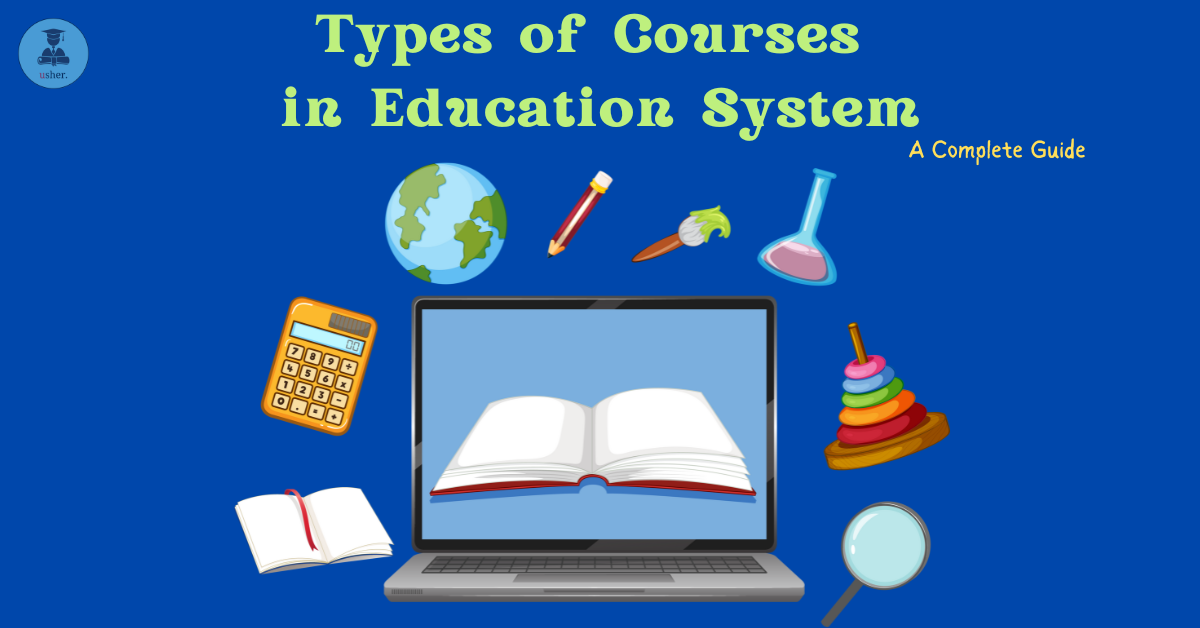Introduction
Definition of Ethics
Ethics means a person’s moral values and principles, and how the individual conducts himself during an activity. It is the basic set of rights and wrongs and forming an ideology, according to which an individual behaves. Every person’s moral values differ from one another.
However, there should be uniformity in the students’ ethics. It is important because similar ethics in every student’s life will create homogenous patterns of moral values amongst everyone. In this blog, we will discuss the role of ethics in a student’s life and how it can help them in their career growth.
Importance of Ethics in Student Life

Ethics play a crucial role in shaping the character and behavior of students. Here are some reasons why ethics are important in student life:
Building Character
Ethics help students develop strong character traits such as honesty, integrity, responsibility, and respect. These qualities are essential for personal growth and success in both academic and professional endeavors.
Decision-Making Skills
Ethical standards establish a foundation for making sound decisions. Knowing the value of ethics increases a student’s propensity to think through the ramifications of their decisions and act morally, even under pressure.
Respect for Others
Ethics promote respect for the rights, feelings, and perspectives of others. Students who practice ethical behavior are more likely to treat their peers, teachers, and community members with kindness, empathy, and fairness.
Academic Integrity
Ethical behavior is essential for maintaining academic integrity. Students who engage in dishonest practices such as cheating, plagiarism, or academic dishonesty undermine the value of their education and compromise their learning.
Professional Development
Ethical behavior is highly valued in the professional world. Students who demonstrate ethical conduct in their academic pursuits are better prepared for success in their future careers. Employers seek candidates who possess strong moral principles and can be trusted to act ethically in the workplace.
Social Responsibility
Ethics encourage students to consider the broader impact of their actions on society and the environment. By promoting social responsibility, students can contribute positively to their communities and work towards creating a more just and sustainable world.
Personal Fulfillment
Living according to ethical principles can lead to a sense of personal fulfillment and satisfaction. Students who prioritize integrity, honesty, and compassion in their lives are more likely to experience greater happiness and fulfillment.
Understanding Ethics

Different Perspectives on Ethics
Here are some of the most prominent perspectives on ethics:
Deontological Ethics – Ethics is the branch of philosophy that aims at ascertaining what is morally correct and incorrect, encompassing different ideologies and perspectives.
Deontologists argue that certain actions are inherently moral or immoral, regardless of their outcomes.
Philosophers like Immanuel Kant advocate this perspective and focus on the intrinsic rightness or wrongness of actions themselves, instead of their consequences.
Consequentialist Ethics – According to consequentialism, an action’s morality is determined by its results or repercussions.
One consequentialist theory is utilitarianism, which maintains that the best course of conduct is the one that maximizes overall happiness or pleasure and minimizes pain or suffering for the largest number of individuals.
Virtue Ethics – This perspective, traced back to Aristotle, emphasizes the development of moral character and virtues such as courage, honesty, and compassion.
Virtue ethicists argue that being a good person involves cultivating virtuous traits and habits.
Ethics of Care – Developed in feminist ethics, the ethics of care emphasizes interpersonal relationships and the importance of empathy, compassion, and responsiveness to the needs of others.
This perspective highlights the moral significance of caring for individuals in vulnerable positions.
Religious Ethics – Many religious traditions provide ethical frameworks based on divine commandments, scriptures, or theological principles.
These ethics often involve moral duties and obligations derived from religious teachings, such as the Ten Commandments in Judaism and Christianity or the Five Pillars of Islam.
Natural Law Ethics – Grounded in the idea that there is a natural order to the universe, natural law ethics asserts that certain moral principles are inherent and can be discovered through reason.
This perspective often intersects with religious ethics but can also be secular.
Contractualism – Contractualist theories, like those proposed by philosophers such as John Rawls, suggest that moral principles arise from hypothetical agreements or social contracts made among rational individuals.
These agreements aim to establish fair and just society rules.
Egoism – Egoistic theories prioritize the self-interest of individuals as the basis for ethical decision-making.
Ethical egoism, for instance, asserts that individuals ought to act in their self-interest, while psychological egoism posits that individuals naturally act in their self-interest regardless of moral considerations.
These perspectives offer different approaches to ethical questions and dilemmas, each emphasizing different aspects of moral reasoning, principles, and values.
Depending on the context and individual beliefs, one may find resonance with one or more of these ethical perspectives.
Core Principles of Ethical Behavior

Ethical behavior is guided by a set of core principles that serve as foundational concepts for determining right and wrong actions.
While different ethical frameworks may emphasize particular principles over others, there are several commonly recognized core principles of ethical behavior:
Respect for Autonomy – This principle emphasizes the importance of respecting individuals’ right to make their own decisions and choices without coercion or undue influence.
Autonomy recognizes individuals as moral agents capable of self-determination.
Beneficence – The principle of beneficence entails the obligation to do good and promote the well-being of others.
Ethical actors strive to maximize benefits and minimize harm in their actions, seeking to improve the welfare of individuals and communities.
Nonmaleficence – Nonmaleficence dictates the obligation to avoid causing harm or inflicting injury on others.
Ethical behavior involves refraining from actions that may result in harm, injury, or suffering, and taking precautions to prevent harm when possible.
Justice – Justice involves the fair and equitable distribution of resources, opportunities, and burdens within society.
Ethical actors strive to treat individuals fairly, impartially, and without discrimination, ensuring that everyone receives what is due to them and that societal benefits and burdens are distributed justly.
Honesty and Integrity – Ethical behavior entails being truthful, transparent, and sincere in one’s dealings with others.
Honest communication and integrity in actions build trust and credibility, fostering positive relationships and ethical conduct.
Fidelity – Fidelity, or loyalty, emphasizes the importance of honoring commitments, obligations, and promises made to others.
Ethical actors are faithful to their responsibilities and relationships, maintaining trustworthiness and reliability in their interactions.
Respect for Others – Respect for others involves recognizing and valuing the inherent worth, dignity, and rights of all individuals.
Ethical behavior entails treating others with courtesy, fairness, compassion, and empathy, regardless of differences in identity, background, or beliefs.
Accountability and Responsibility – Ethical actors accept responsibility for their actions and decisions, acknowledging the consequences of their behavior and taking ownership of any mistakes or shortcomings.
Accountability involves being answerable to oneself and others for upholding ethical standards and fulfilling obligations.
These core principles guide ethical decision-making and behavior across various contexts and relationships, helping individuals navigate moral dilemmas and uphold ethical standards in their personal and professional lives.
While the relative importance of these principles may vary depending on cultural, social, and situational factors, they collectively contribute to the foundation of ethical behavior.
How Ethics Relates to Personal Values

Ethics and personal values are closely intertwined, as personal values often form the basis for ethical beliefs and behaviors. Here’s how ethics relates to personal values:
Foundation of Ethics – Personal values serve as the foundation upon which ethical principles and beliefs are built.
These values are deeply held beliefs and convictions about what is important, desirable, and morally right or wrong for an individual.
Ethics, in turn, involves the application of these values to make moral judgments and decisions.
Influence on Moral Decision-Making – Personal values play a significant role in shaping an individual’s moral decision-making process.
When faced with ethical dilemmas or choices, individuals often rely on their values to guide their actions and determine what they perceive to be the right course of conduct.
Values such as honesty, integrity, compassion, and fairness may influence how individuals weigh competing ethical considerations and make ethical judgments.
Alignment with Ethical Principles – Ethical behavior is often aligned with an individual’s values.
When individuals act by their deeply held values, they are more likely to behave ethically and uphold moral standards in their interactions with others.
For example, a person who values honesty is more likely to prioritize truthfulness and integrity in their actions, even when faced with temptations to deceive or act dishonestly.
Reflection of Identity and Identity – Personal values are integral to an individual’s sense of identity and self-concept.
Ethical behavior that is consistent with one’s values reinforces a sense of integrity, authenticity, and self-respect.
Conversely, engaging in behavior that contradicts one’s values can lead to feelings of guilt, cognitive dissonance, and moral distress.
Cultural and Social Context – Personal values are shaped by various influences, including cultural norms, familial upbringing, religious beliefs, education, and life experiences.
As such, the relationship between ethics and personal values is also influenced by cultural and social factors.
What is considered ethical or morally acceptable may vary across different cultural contexts, reflecting the diversity of personal values within societies.
Continual Reflection and Development – Ethical behavior involves continual reflection on and refinement of personal values.
As individuals encounter new experiences, challenges, and perspectives, they may reassess and adapt their values and ethical beliefs accordingly.
This ongoing process of self-examination and moral growth contributes to the dynamic interplay between ethics and personal values.
In summary, ethics and personal values are interconnected aspects of individual morality, with personal values serving as the bedrock upon which ethical principles and behaviors are constructed.
The alignment between personal values and ethical conduct contributes to a sense of integrity, identity, and moral authenticity for individuals.
The Significance of Ethics in Student Life

Building Character and Integrity
Building character and integrity in students is a crucial aspect of education, as it helps cultivate ethical behavior, responsible citizenship, and positive social relationships.
Here are several ways schools can foster character development and instill integrity in students:
Explicit Instruction – Schools can incorporate explicit instruction on character traits such as honesty, respect, responsibility, empathy, and perseverance into the curriculum.
Teachers can engage students in discussions, activities, and reflection exercises that promote understanding and appreciation of these values.
Modeling Behavior – Educators serve as role models for students, and their actions and behaviors can significantly influence students’ attitudes and values.
Teachers and school staff should demonstrate integrity, fairness, kindness, and ethical conduct in their interactions with students and colleagues.
Cultivating a Positive School Culture – Schools can create a supportive and inclusive environment that fosters a sense of belonging, respect, and cooperation among students.
Promoting a positive school culture helps students develop social-emotional skills and attitudes conducive to ethical behavior and character development.
Opportunities for Service and Leadership – Providing opportunities for students to engage in service-learning projects, community service activities, and leadership roles enables them to develop empathy, compassion, and a sense of social responsibility.
Service-oriented experiences encourage students to contribute positively to their communities and develop a deeper understanding of ethical values in action.
Character Education Programs – Schools can implement comprehensive character education programs that integrate character development across various aspects of the curriculum and school life.
These programs may include explicit instruction, experiential learning opportunities, and school-wide initiatives focused on promoting positive character traits and ethical behavior.
Encouraging Critical Thinking and Ethical Decision-Making

Schools should foster critical thinking skills and provide opportunities for students to engage in ethical decision-making processes.
Encouraging students to analyze ethical dilemmas, consider diverse perspectives, and evaluate the consequences of their actions promotes ethical reasoning and moral development.
Promoting Academic Integrity – Schools should emphasize the importance of academic integrity and uphold high standards of honesty, fairness, and intellectual integrity.
Educators can educate students about plagiarism, cheating, and ethical standards in academic work, and implement strategies to prevent academic dishonesty.
Parent and Community Involvement – Collaborating with parents, families, and community members enhances efforts to promote character and integrity in students.
Schools can engage families in discussions about values, provide resources for reinforcing character education at home, and involve community partners in character-building initiatives.
Recognition and Reinforcement – Schools can recognize and celebrate students who demonstrate exemplary character and integrity. Acknowledging students’ positive behavior reinforces ethical conduct and encourages others to emulate these values.
Continuous Evaluation and Improvement – Schools should regularly evaluate their efforts to promote character development and integrity, seeking feedback from students, parents, and staff.
Continuous assessment allows schools to identify areas for improvement and refine strategies for building character and fostering ethical behavior in students.
By incorporating these approaches into their educational practices, schools can play a vital role in nurturing the character and integrity of students, preparing them to become responsible, ethical, and contributing members of society.
Fostering Trust and Respect
Fostering trust and respect in students is essential for creating a positive and supportive learning environment. Here are several strategies schools can implement to promote trust and respect among students:
Promote Positive Relationships – Encourage inclusivity and celebrate diversity within the school community. Provide pupils the chance to learn about many cultures, vantage points, and backgrounds. Promote respect for one another and diversity.
Model Respectful Behavior – School staff, including teachers, administrators, and support staff, should model respectful behavior in their interactions with students and colleagues. Demonstrating empathy, active listening, and fairness fosters a culture of respect and sets a positive example for students to follow.
Establish Clear Expectations –Communicate expectations for behavior, communication, and interactions within the school community. Establishing clear guidelines and boundaries helps students understand what is expected of them and promotes a sense of security and predictability.
Teach Conflict Resolution Skills – Provide students with opportunities to learn and practice conflict resolution skills, including negotiation, compromise, and problem-solving. Teach strategies for resolving conflicts peacefully, such as active listening, empathy, and seeking common ground.
Promote Diversity and Inclusion – Celebrate diversity and promote inclusivity within the school community. Create opportunities for students to learn about different cultures, backgrounds, and perspectives, and encourage mutual respect and appreciation for diversity.
Encourage consideration and empathy – All teachers must promote empathy in students and motivate them to consider others’ perspectives and emotions. This can be done by engaging students in perspective-based exercises where a group of pupils can participate, teachers can discuss real-world practical issues in the class, and explore social justice and equality-based topics.
Stringent actions by institutions against bullying and harassment – Schools and universities must take strong actions against bullying and ragging. Many students go through mental and physical harassment by their seniors. Faculties staff members and even students should be trained to handle such cases.
Promote Student Voice and Agency – Empower students to have a voice in decision-making processes and initiatives that affect their school experience. Create opportunities for student leadership, involvement in school governance, and participation in committees or student councils.
Provide Supportive Counseling and Resources – Offer counseling services and resources to support students who may be experiencing social or emotional challenges. Provide a safe and confidential space for students to seek guidance, express concerns, and receive assistance in navigating interpersonal relationships.
Celebrate and Recognize Positive Behavior – Acknowledge and celebrate acts of kindness, respect, and cooperation among students. Implement recognition programs, awards, or ceremonies to highlight positive behavior and reinforce the importance of trust and respect within the school community.
By implementing these strategies consistently and intentionally, schools can create a culture that promotes trust, respect, and positive relationships among students, contributing to a supportive and inclusive learning environment.
Promoting Responsibility and Accountability
Promoting responsibility and accountability in students is crucial for their academic success, personal growth, and development as responsible citizens. Here are several strategies schools can implement to foster responsibility and accountability among students:
Set Clear Expectations – Establish clear expectations for academic performance, behavior, and attendance.
Communicate classroom rules, academic standards, and attendance policies to students, ensuring they understand what is expected of them.
Teach Goal Setting – Teach students how to set realistic and achievable goals for their academic, personal, and social development.
Encourage students to set short-term and long-term goals, break them down into manageable steps, and monitor their progress regularly.
Provide Supportive Structures – Create supportive structures and routines that help students stay organized, manage their time effectively, and prioritize their responsibilities.
Provide tools and resources such as planners, checklists, and time management techniques to help students stay on track.
Encourage Self-Reflection – Encourage students to reflect on their actions, behaviors, and academic performance.
Provide opportunities for self-assessment and reflection, prompting students to consider their strengths, areas for improvement, and strategies for growth.
Promote Independence and Self-Advocacy – Motivate pupils to be advocates for their needs and to take charge of their education.
Instruct students on how to ask for assistance when necessary, interact with peers and teachers effectively and take charge of their own academic and personal growth.
Hold Students Accountable – Hold students accountable for their actions and decisions by enforcing consequences for both positive and negative behavior.
Consistently apply consequences for academic dishonesty, disruptive behavior, and failure to meet expectations, while also recognizing and rewarding responsible behavior.
Provide Opportunities for Leadership – Offer opportunities for students to take on leadership roles and responsibilities within the school community.
Empower students to lead clubs, committees, or service projects, fostering a sense of ownership and accountability for their actions.
Encourage Collaboration and Teamwork – Promote collaboration and teamwork through group projects, cooperative learning activities, and extracurricular opportunities.
Encourage students to work together, communicate effectively, and take collective responsibility for shared goals and outcomes.
Model Responsible Behavior – Model responsible behavior as educators and school staff. Demonstrate punctuality, professionalism, and integrity in your interactions with students and colleagues, serving as positive role models for responsible behavior.
Provide Constructive Feedback – Offer constructive feedback to students on their academic performance, behavior, and efforts to take responsibility.
Provide specific feedback on areas for improvement, offer guidance and support, and encourage students to learn from their mistakes and take proactive steps to address challenges.
By implementing these strategies consistently and intentionally, schools can help cultivate a culture of responsibility and accountability among students, empowering them to succeed academically and thrive as responsible members of society.
Challenges to Ethical Behavior in Student Life

Peer Pressure and Social Influence
Dealing with peer pressure and social influence can be challenging for students, but there are several strategies they can employ to navigate these situations effectively:
Be Assertive – Encourage students to assertively express their thoughts, feelings, and boundaries when faced with peer pressure. Teach them to confidently say “no” to situations that make them uncomfortable or go against their values.
Choose Friends Wisely – Encourage students to surround themselves with friends who share their values and support their goals. Positive peer relationships can provide a supportive network and help students resist negative peer pressure.
Practice Refusal Skills – Teach students specific refusal skills and strategies they can use to resist peer pressure, such as offering alternatives, changing the subject, or walking away from a situation. Role-play scenarios to help students practice assertive communication and decision-making.
Build Self-Confidence – Help students develop self-confidence and self-esteem by recognizing their strengths, talents, and achievements. Encourage them to pursue interests and activities that build self-confidence and provide a sense of identity and purpose.
Develop Critical Thinking Skills – Teach students to think critically about the influence of peer pressure and media messages on their behavior and decision-making. Encourage them to question stereotypes, media portrayals, and social norms, and to make informed choices based on their values and beliefs.
Set Boundaries – Encourage students to establish clear boundaries for themselves and communicate these boundaries assertively to their peers. Help them understand that it’s okay to say “no” and prioritize their well-being and values.
Seek Support – Encourage students to seek support from trusted adults, such as parents, teachers, or school counselors, when they feel overwhelmed by peer pressure or social influence. These adults can provide guidance, perspective, and support in navigating challenging situations.
Develop Coping Skills – Teach students healthy coping skills for managing stress, anxiety, and peer pressure, such as deep breathing, mindfulness, and problem-solving. Encourage them to engage in activities that promote relaxation, self-care, and emotional well-being.
Focus on Personal Values – Help students identify and clarify their values, beliefs, and goals. Encourage them to make decisions that align with their values and to prioritize what is important to them, even in the face of peer pressure.
Encourage Open Communication – Create a supportive and non-judgmental environment where students feel comfortable discussing their experiences with peer pressure and seeking advice or support from peers and adults.
By equipping students with these skills and strategies, educators can empower them to resist negative peer pressure, make independent choices, and develop a strong sense of self-confidence and identity.
Academic Pressure and Cheating

Dealing with academic pressure can be challenging for students, but there are several strategies they can employ to manage stress and maintain their well-being:
Time Management – Help students develop effective time management skills by creating schedules, setting priorities, and breaking tasks into manageable chunks. Encourage them to allocate time for studying, relaxation, and extracurricular activities.
Healthy Habits – Encourage students to prioritize their physical and mental health by getting enough sleep, eating nutritious foods, exercising regularly, and practicing relaxation techniques such as deep breathing or meditation.
Set Realistic Goals – Encourage students to set realistic and achievable academic goals based on their abilities and interests. Help them break larger goals into smaller milestones and celebrate their progress along the way.
Seek Support – Encourage students to seek support from teachers, counselors, or peers when they are feeling overwhelmed by academic pressure. Remind them that it’s okay to ask for help and that support is available when needed.
Practice Self-Care – Encourage students to engage in activities that promote self-care and relaxation, such as spending time with friends and family, pursuing hobbies, or enjoying nature. Remind them that taking breaks and engaging in enjoyable activities is essential for maintaining balance and well-being.
Manage Perfectionism – Help students recognize and challenge perfectionistic tendencies that can contribute to academic pressure. Encourage them to focus on progress rather than perfection and to embrace mistakes as opportunities for learning and growth.
Stay Organized – Teach students organizational skills such as keeping track of assignments, maintaining a tidy workspace, and using tools such as planners or digital calendars to stay organized and on top of deadlines.
Practice Mindfulness – Introduce students to mindfulness techniques such as mindfulness meditation or mindful breathing to help them stay present and focused, reduce stress, and improve concentration.
Maintain Perspective – Encourage students to maintain perspective and remember that academic success is just one aspect of their lives. Remind them that their worth is not determined by their grades and that it’s important to prioritize their overall well-being and happiness.
Celebrate Achievements – Celebrate students’ achievements and efforts, no matter how big or small. Recognize their hard work, progress, and resilience in the face of academic challenges.
Now, regarding why a student should never cheat in exams:
Integrity – Cheating undermines the integrity of the academic process and devalues the hard work of honest students. It erodes trust between students, teachers, and educational institutions.
Fairness – Cheating creates an unfair advantage for those who engage in it, disadvantaging honest students who have worked hard to earn their grades through legitimate means.
Learning – Cheating deprives students of the opportunity to learn and develop important skills such as critical thinking, problem-solving, and self-discipline. It promotes a culture of shortcuts and undermines the educational goals of academic institutions.
Character – Engaging in dishonest behavior erodes students’ character and ethical principles. It sends the message that dishonesty is acceptable or even rewarded, leading to long-term consequences for students’ personal and professional integrity.
Consequences – Cheating can have serious consequences, both academically and personally. Students who are caught cheating may face disciplinary actions such as failing grades, academic probation, or expulsion. Moreover, cheating can damage students’ reputations and future opportunities.
Self-Respect – Cheating undermines students’ self-respect and confidence in their abilities. It creates a cycle of dependency on dishonest practices rather than empowering students to succeed through their efforts and abilities.
Professional Ethics – Cheating sets a poor precedent for students’ future behavior in academic and professional settings. It undermines the principles of honesty, integrity, and ethical conduct that are essential for success in any field.
Long-Term Impact – Cheating can have long-term consequences for students’ academic and professional careers. Academic dishonesty records may be reported to other educational institutions or employers, jeopardizing students’ future opportunities and credibility.
In summary, cheating in exams is unethical, undermines the integrity of the academic process, and has serious consequences for students’ learning, character, and prospects. Students need to uphold honesty and integrity in all aspects of their academic and personal lives.
Technological Influence and Ethical Dilemmas

Technological influence on students can present various ethical dilemmas and challenges. Here are some common ethical dilemmas related to technological influence on students:
Privacy Concerns – The use of technology, particularly social media and online platforms, raises privacy concerns. Students may face ethical dilemmas regarding the sharing of personal information, photos, or private conversations online, as well as the potential for data breaches or misuse of personal information by third parties.
Digital Citizenship – Students must navigate the ethical implications of their online behavior, including issues such as cyberbullying, online harassment, and digital citizenship. They may face dilemmas related to respecting others’ rights and dignity in online interactions, as well as understanding the long-term consequences of their digital footprint.
Academic Integrity – The widespread availability of information online raises ethical dilemmas related to academic integrity, such as plagiarism, cheating, and improper citation practices. Students may struggle to distinguish between acceptable and unacceptable uses of online resources and face pressure to take shortcuts in their academic work.
Digital Divide – Technological influence can exacerbate existing disparities in access to resources and opportunities, creating ethical dilemmas related to equity and social justice. Students from disadvantaged backgrounds may face barriers to accessing technology and digital resources, leading to unequal educational opportunities and outcomes.
Online Safety – Students must navigate ethical dilemmas related to online safety, including exposure to inappropriate content, online predators, and cybersecurity threats. They may face pressure to engage in risky behaviors or share sensitive information online, raising concerns about their safety and well-being.
Addiction and Distraction – The pervasive use of technology can contribute to issues such as smartphone addiction, internet addiction, and excessive screen time, raising ethical dilemmas related to self-control, balance, and well-being. Students may struggle to manage their technology use and face challenges in maintaining healthy habits and relationships offline.
Digital Manipulation and Misinformation – Students encounter ethical dilemmas related to digital manipulation and misinformation, including issues such as fake news, photo manipulation, and online propaganda. They must develop critical thinking skills to evaluate the credibility and accuracy of online information and resist manipulation and deception.
Intellectual Property – The ease of copying and sharing digital content raises ethical dilemmas related to intellectual property rights and copyright infringement. Students may face challenges in understanding and respecting copyright laws and intellectual property rights when accessing, sharing, or creating digital content.
Surveillance and Monitoring – The use of technology for surveillance and monitoring raises ethical dilemmas related to privacy, autonomy, and civil liberties. Students may feel a sense of intrusion or surveillance in educational settings where technology is used for monitoring academic performance, behavior, or attendance.
Ethical Use of Technology – Students must grapple with ethical dilemmas related to the responsible and ethical use of technology, including issues such as digital activism, online advocacy, and the ethical use of artificial intelligence and automation. They must consider the potential ethical implications of their technological choices and actions on society, the environment, and future generations.
In navigating these ethical dilemmas, students benefit from guidance, education, and support from educators, parents, and mentors. By fostering critical thinking, ethical reasoning, and digital literacy skills, students can develop the knowledge, skills, and values needed to navigate the complex ethical landscape of the digital age.
Strategies for Cultivating Ethical Behavior
Education and Awareness
Education and awareness are powerful tools for cultivating ethical behavior in students. Here are several strategies that schools can implement to promote ethical behavior through education and awareness:
Integrate Ethics Across the Curriculum – Embed ethical principles and discussions into various subjects and lessons across the curriculum. For example, teachers can incorporate case studies, literature, historical events, and current events that raise ethical questions and dilemmas for students to analyze and discuss.
Character Education Programs – Implement comprehensive character education programs that explicitly teach and reinforce ethical values such as honesty, integrity, respect, responsibility, and empathy. These programs can include structured lessons, activities, and discussions focused on developing students’ moral character and decision-making skills.
Promote Critical Thinking and Ethical Reasoning – Teach students critical thinking skills and provide opportunities for them to engage in ethical reasoning and moral decision-making. Encourage students to consider diverse perspectives, weigh competing values, and evaluate the consequences of their actions on themselves and others.
Encourage Reflection and Discussion – Create opportunities for students to reflect on ethical dilemmas and engage in open and respectful discussions about ethical issues. Provide a safe and supportive environment where students feel comfortable expressing their opinions, asking questions, and challenging their own beliefs.
Use Real-World Examples and Role Models – Incorporate real-world examples of ethical behavior and role models who exemplify ethical principles into classroom discussions and activities. Highlight the positive impact of ethical behavior on individuals, communities, and society as a whole.
Promote Empathy and Perspective-Taking – Promote empathy and perspective-taking by helping students understand and appreciate the experiences, feelings, and perspectives of others. Encourage students to consider how their actions affect others and to empathize with individuals who may be different from themselves.
Teach Digital Citizenship and Online Ethics – Provide education and awareness about digital citizenship and online ethics, including issues such as cyberbullying, online privacy, digital footprints, and responsible use of technology. Teach students how to navigate ethical challenges in digital environments and promote positive online behavior.
Provide Ethical Leadership Opportunities – Empower students to take on leadership roles and responsibilities that promote ethical behavior and values within the school community. Encourage students to lead by example, advocate for ethical principles, and initiate positive change.
Involve Parents and Families – Engage parents and families in discussions about ethics and moral development, providing resources and strategies for reinforcing ethical values at home. Encourage open communication between parents, teachers, and students about ethical issues and concerns.
Lead by Example – Model ethical behavior and demonstrate a commitment to ethical values in all aspects of school leadership, administration, and teaching. Create a school culture that prioritizes integrity, honesty, and respect, and hold all members of the school community accountable for upholding these values.
By implementing these strategies, schools can foster a culture of ethical behavior, integrity, and responsibility among students, empowering them to make ethical choices and contribute positively to their communities and society.
Role of Parents and Teachers in Students’ Life

Parents, teachers, and mentors play crucial roles in promoting ethics and moral values in students. Here’s how each can contribute:
Parents
Setting Examples- Parents serve as primary role models for their children. By demonstrating ethical behavior and moral values in their actions and decisions, parents instill these values in their children from a young age.
Open Communication – Encouraging open communication and dialogue with children about ethical issues helps reinforce moral values. Parents can engage in discussions about right and wrong, empathy, kindness, and integrity, helping children develop a strong moral compass.
Establishing Family Values – Parents can establish and reinforce family values that prioritize honesty, respect, responsibility, and compassion. Consistently emphasizing these values in family routines, rituals, and interactions helps reinforce their importance to children.
Providing Guidance – Parents provide guidance and support to children in navigating ethical dilemmas and making moral decisions. By offering advice, encouragement, and perspective, parents help children develop critical thinking skills and ethical reasoning abilities.
Promoting Empathy and Understanding – Encouraging empathy and understanding towards others’ perspectives and experiences helps children develop compassion and consideration for others. Parents can model empathy in their interactions with others and provide opportunities for children to practice empathy in their daily lives.
Teachers
Creating a Positive Classroom Culture – Teachers play a crucial role in creating a positive and supportive classroom environment that promotes ethical behavior and mutual respect among students. By modeling ethical conduct and fostering a culture of kindness and inclusivity, teachers help create a safe space for students to learn and grow.
Incorporating Ethical Discussions – Teachers can incorporate discussions about ethics and moral values into their lesson plans and curriculum. Engaging students in conversations about ethical dilemmas, moral reasoning, and the consequences of actions helps foster critical thinking and ethical awareness.
Teaching Social and Emotional Skills – Teaching social and emotional skills such as empathy, communication, conflict resolution, and decision-making helps students develop the interpersonal skills needed to navigate ethical challenges and build positive relationships.
Promoting Academic Integrity – Teachers play a crucial role in promoting academic integrity and ethical conduct in the classroom. By setting clear expectations for academic honesty, providing guidance on proper citation and referencing practices, and enforcing consequences for academic dishonesty, teachers help reinforce the importance of integrity in academic work.
Encouraging Service Learning – Incorporating service-learning projects and community service activities into the curriculum provides students with opportunities to apply ethical principles in real-world contexts. By engaging in acts of service and contributing to their communities, students develop a sense of social responsibility and empathy for others.
Mentors
Providing Guidance and Support – Mentors serve as trusted advisors and role models who provide guidance, encouragement, and support to students. By offering mentorship and coaching, mentors help students develop their ethical reasoning skills, navigate ethical dilemmas, and make moral decisions.
Offering Real-World Perspective – Mentors can share their own experiences and insights into ethical challenges they have faced in their personal and professional lives. By providing real-world perspectives and examples, mentors help students understand the complexities of ethical decision-making and the importance of integrity in various contexts.
Encouraging Reflection and Self-Discovery – Mentors encourage students to reflect on their values, beliefs, and goals, helping them develop a deeper understanding of their ethical principles and moral identity. By fostering self-awareness and self-discovery, mentors empower students to make ethical choices aligned with their values.
Modeling Ethical Behavior – Mentors serve as role models for students, demonstrating ethical behavior and integrity in their actions and decisions. By modeling ethical conduct and values-based leadership, mentors inspire students to emulate these qualities and strive for excellence in their own lives.
In summary, parents, teachers, and mentors all play essential roles in promoting ethics and moral values in students. By setting examples, fostering open communication, providing guidance and support, and modeling ethical behavior, these influential figures help shape the ethical development of students and prepare them to become responsible, ethical, and compassionate members of society.
Encouraging Critical Thinking and Moral Reasoning in Students

Encouraging critical thinking and moral reasoning in students is essential for their ethical development and ability to make informed, responsible decisions. Here are some strategies to promote critical thinking and moral reasoning in students:
Engage in Ethical Discussions – Create opportunities for students to engage in discussions about moral dilemmas, ethical issues, and real-world challenges. Encourage them to analyze different perspectives, consider the consequences of actions, and evaluate the ethical implications of various choices.
Use Case Studies and Scenarios – Present students with case studies, scenarios, or ethical dilemmas relevant to their lives and experiences. Encourage them to apply critical thinking skills to analyze the situation, identify ethical considerations, and propose solutions or courses of action based on moral reasoning.
Promote Perspective-Taking – Encourage students to consider different viewpoints and perspectives, including those that may differ from their own. Teach them to empathize with others’ experiences, beliefs, and values, and to understand the complex factors that influence ethical decision-making.
Provide Ethical Frameworks and Theories – Introduce students to ethical frameworks and theories, such as utilitarianism, deontology, virtue ethics, and ethics of care. Help them understand the principles underlying these theories and how they can be applied to analyze ethical dilemmas and make moral judgments.
Encourage Questioning and Inquiry – Foster a culture of curiosity and inquiry by encouraging students to ask questions, challenge assumptions, and seek evidence to support their conclusions. Teach them to critically evaluate information, sources, and arguments to discern truth from misinformation.
Develop Decision-Making Skills – Provide opportunities for students to practice decision-making skills in various contexts. Encourage them to weigh the potential consequences of different options, consider their values and priorities, and make informed, ethically responsible choices.
Integrate Ethics Across the Curriculum – Integrate ethical considerations and discussions into various subject areas and disciplines. Help students understand how ethics intersect with topics such as science, technology, literature, history, and social justice, fostering interdisciplinary connections and deepening their understanding of ethical issues.
Model Ethical Behavior – Model ethical behavior and critical thinking skills as an educator. Demonstrate intellectual curiosity, open-mindedness, and a commitment to ethical principles in your actions and decisions, serving as a positive role model for students.
Provide Constructive Feedback – Offer constructive feedback and guidance to students as they engage in critical thinking and moral reasoning activities. Encourage them to reflect on their reasoning process, consider alternative perspectives, and refine their arguments and conclusions based on feedback.
Promote Action and Advocacy- Encourage students to translate their critical thinking and moral reasoning skills into action and advocacy for positive change. Empower them to identify issues they care about, engage in activism or community service, and advocate for ethical principles and social justice.
By implementing these strategies consistently and intentionally, educators can foster the development of critical thinking and moral reasoning skills in students, empowering them to navigate ethical challenges, make principled decisions, and contribute positively to society.
Practical Applications of Ethics in Student Life

Decision-Making in Academics
Let’s see the practical applications of how students can practice good ethics while making decisions in their academic field.
Proper Citation and Referencing – When writing a research paper or assignment, a student ensures to properly cite and reference all sources used. This includes paraphrasing information appropriately and providing citations for direct quotes, thus giving credit to the original authors and avoiding plagiarism.
Respecting Deadlines – A student manages their time effectively to submit assignments and projects on time, demonstrating respect for deadlines and showing integrity in fulfilling academic responsibilities.
Group Work Collaboration – In group projects, a student actively participates, communicates openly with group members, and contributes their fair share of work. They ensure that credit is shared equitably among all members and that no one is unfairly burdened or left out.
Ethical Conduct in Exams – During exams, a student refrains from cheating or engaging in any form of dishonest behavior. They rely on their knowledge and preparation, adhering to exam rules and regulations.
Ethical Research Practices – When conducting research, a student follows ethical guidelines and obtains necessary approvals, particularly when working with human subjects or sensitive data. They prioritize the well-being and confidentiality of participants and ensure informed consent.
Respecting Intellectual Property – A student refrains from using unauthorized materials or resources during exams or assignments. They respect the intellectual property rights of others and avoid using cheat sheets, unauthorized notes, or other unfair advantages.
Transparent Communication – If faced with a situation where academic integrity may be compromised, such as witnessing cheating or plagiarism, a student communicates their concerns to the relevant authorities, such as professors or academic integrity committees, in a timely and transparent manner.
Balancing Academic and Personal Integrity – A student maintains a balance between academic success and personal integrity, understanding that achieving good grades should not come at the expense of ethical principles. They prioritize learning and growth over mere achievement.
Respectful Interactions with Peers and Faculty – A student treats their peers, instructors, and other members of the academic community with respect and professionalism. They engage in constructive dialogue, listen to diverse perspectives, and avoid engaging in disrespectful or discriminatory behavior.
Ethical Use of Technology – In an increasingly digital academic environment, a student uses technology responsibly and ethically. They avoid hacking, unauthorized access to academic materials, or any form of cyber misconduct.
These examples demonstrate how students can integrate ethical considerations into various aspects of their academic lives, promoting integrity, fairness, and respect within the academic community.
Interpersonal Relationships and Communication

Here are some practical examples of how students can apply good ethics and moral values in interpersonal relationships and communication:
Active Listening – You can practice active listening by giving your full attention to others during conversations and showing respect and empathy for their perspectives and feelings.
Honesty and Truthfulness – You can prioritize honesty in your interactions, being truthful and transparent in your communication rather than resorting to lies or deception to avoid uncomfortable situations.
Respect for Diversity – You must demonstrate respect for diversity by embracing differences in opinions, backgrounds, and cultures, promoting an inclusive and tolerant environment where everyone feels valued and respected.
Empathy and Compassion – You must show empathy and compassion towards others by understanding their emotions, offering support, and being considerate of their feelings, especially during challenging times.
Conflict Resolution Skills – You can develop effective conflict resolution skills, such as active listening, problem-solving, and compromise, to address conflicts or disagreements constructively and respectfully.
Boundaries and Consent – Respect personal boundaries and seek consent before engaging in any actions that may affect others, ensuring that your interactions are consensual and respectful of individual autonomy.
Integrity in Relationships – You must uphold integrity in your relationships by being trustworthy, dependable, and accountable for your actions, thus building trust and mutual respect with others.
Responsible Use of Social Media – Exercise caution and responsibility when using social media platforms, refraining from cyberbullying, spreading rumors, or engaging in harmful online behaviors that may damage relationships or reputations.
Conflict Mediation – In group settings or interpersonal conflicts, you may act as a mediator to facilitate constructive dialogue and find mutually beneficial solutions that uphold the dignity and rights of all parties involved.
Positive Communication – Try to promote positive communication by using language that is respectful, supportive, and encouraging, promoting a culture of kindness and cooperation in your interactions with others.
By applying these ethical and moral values in their interpersonal relationships and communication, students can contribute to creating a positive and harmonious community where mutual respect, understanding, and trust thrive.
Engagement in Extracurricular Activities

Here are some practical examples of how students can apply good ethics and moral values in their engagement in extracurricular activities:
Leadership with Integrity – You can demonstrate ethical leadership by leading extracurricular clubs or organizations with integrity, fairness, and transparency. Also, prioritize the well-being of all members and ensure that decisions are made democratically and inclusively.
Service to Others – You must participate in community service activities with a genuine desire to make a positive impact on others’ lives, showing compassion, empathy, and a commitment to social responsibility.
Respect for Diversity and Inclusion- In multicultural or diversity-focused clubs, you must respect and celebrate differences in race, ethnicity, gender, religion, and other identities. You must promote inclusivity and create welcoming environments for all members.
Environmental Stewardship – You can engage in environmental initiatives or clubs with a sense of responsibility toward protecting the environment. Adopt sustainable practices, promote conservation efforts, and raise awareness about environmental issues within your communities.
Teamwork and Collaboration – You can collaborate effectively with your peers in extracurricular projects or activities, demonstrating respect, communication skills, and a willingness to compromise for the collective good of the team.
Conflict Resolution and Mediation – When conflicts arise within extracurricular groups or teams, you can use conflict resolution skills to address issues constructively, mediating discussions and finding mutually acceptable solutions that uphold the values of fairness and respect.
Ethical Fundraising and Financial Management – You can get involved in fundraising or financial management activities to ensure transparency, accountability, and ethical conduct in handling funds. Also, adhere to established guidelines and use resources responsibly for the intended purposes.
Positive Role Modeling – You must serve as positive role models for your peers by demonstrating ethical behavior, moral values, and a commitment to making a difference in your community through your involvement in extracurricular activities.
Personal Growth and Reflection – You can engage in extracurricular activities not only for personal fulfillment but also for self-reflection and growth. You must use these opportunities to develop character, values, and leadership skills that will serve you well in your academic and professional pursuits.
By applying these ethical and moral values in your engagement in extracurricular activities, you can contribute to the development of a positive and ethical school or community culture, fostering mutual respect, responsibility, and social consciousness.
Consequences of Unethical Behavior

Academic Penalties and Reputational Damage
Students who engage in unethical behavior face a range of potential academic penalties, depending on the severity and specifics of the offense. Consequences can be imposed by the institution, individual instructors, or both. Here are some common examples:
Failing grades – The most immediate consequence is often a failing grade for the specific assignment or course involved.
Disciplinary probation – This places the student on notice and can restrict future academic activities, such as participation in extracurriculars or receiving scholarships.
Suspension – Temporary removal from the institution for a set period.
Expulsion – Permanent removal from the institution, the most severe academic penalty.
Withdrawal of admission or degree – This can occur if unethical behavior is discovered after admission or degree completion, potentially impacting future academic opportunities.
Reputational Damage – Beyond academic consequences, students who engage in unethical behavior also risk significant reputational damage:
Negative record on transcript – In some cases, disciplinary actions may be reflected on a student’s transcript, which can be seen by future employers and educational institutions.
Loss of trust within the academic community – Unethical behavior can damage a student’s standing within their program or department, potentially impacting future opportunities for research, recommendations, and professional connections.
Social stigma – Depending on the nature of the offense, students may face social stigma and judgment from peers, faculty, and the broader community.
Impact on future career prospects – Depending on the severity and field of study, unethical behavior can negatively impact a student’s ability to secure employment upon graduation.
It’s important to remember that these consequences are intended to deter unethical behavior, promote academic integrity, and uphold the institution’s values. However, it’s crucial to emphasize that consequences should be implemented fairly and with due process.
Students should familiarize themselves with their institution’s academic integrity policies and code of conduct to avoid unethical behavior and its associated consequences.
Long-term Impact on Career and Personal Life

When a student engages in unethical behavior, the long-term impact can extend beyond their academic career and affect their personal and professional life in various ways:
Career Implications
Limited Opportunities – Engaging in unethical behavior can tarnish a student’s reputation and limit their career opportunities. Employers may be reluctant to hire individuals with a history of academic misconduct due to concerns about integrity and trustworthiness.
Professional Reputation – A reputation for unethical behavior can follow individuals into their professional careers, impacting their relationships with colleagues, clients, and employers. It may hinder their ability to advance in their chosen field or secure leadership positions.
Legal Consequences – In some cases, unethical behavior may have legal implications, such as copyright infringement, intellectual property theft, or fraud, which can result in legal action and damage to one’s career prospects.
Personal Consequences
Impact on Relationships – Engaging in unethical behavior can strain personal relationships with friends, family members, and mentors who may be disappointed or disillusioned by the student’s actions. Trust may be eroded, leading to lasting interpersonal conflicts.
Guilt and Shame – Individuals who engage in unethical behavior may experience feelings of guilt, shame, or regret, which can negatively impact their mental health and well-being. These emotions may persist long after the misconduct has occurred, affecting personal happiness and fulfillment.
Self-Esteem – Unethical behavior can undermine a person’s sense of self-worth and self-esteem, as they may struggle with feelings of inadequacy or moral failure. This can lead to low self-confidence and difficulty coping with challenges in both personal and professional life.
Loss of Opportunities – Long-term consequences of unethical behavior may include missed opportunities for personal and professional growth. Individuals may be excluded from leadership roles, academic honors, or prestigious opportunities due to concerns about their integrity and character.
In a nutshell, the long-term impact of engaging in unethical behavior can be significant, affecting both career prospects and personal well-being.
Individuals need to recognize the consequences of their actions and take steps to repair any damage caused, such as seeking forgiveness, making amends, and committing to ethical conduct in the future.
Building a reputation for integrity and ethical behavior is essential for long-term success and fulfillment in both personal and professional life.
Ethical Reflection and Growth Opportunities
Ethical reflection and growth opportunities for students are essential for promoting and focusing on a culture of integrity, responsibility, and ethical decision-making.
Here are some ways students can engage in ethical reflection and growth:
Ethics Workshops and Seminars – Institutions can organize workshops, seminars, or guest lectures focused on ethics and moral reasoning. These sessions provide students with opportunities to explore ethical dilemmas, discuss case studies, and learn ethical decision-making frameworks.
Ethics Courses – Offering courses specifically dedicated to ethics and moral philosophy allows students to delve deeper into ethical theories, principles, and their practical applications in various contexts. These courses provide a structured environment for ethical reflection and critical thinking.
Ethics Committees or Boards – Students can participate in ethics committees or boards within their institutions, where they review ethical issues, develop policies, and provide guidance on ethical matters affecting the campus community.
Service-Learning Programs – Engaging in service-learning programs allows students to apply ethical principles in real-world settings while addressing social issues and community needs. These experiences promote empathy, social responsibility, and ethical decision-making.
Ethical Leadership Opportunities – Leadership roles in student organizations, clubs, or committees provide opportunities for students to practice ethical leadership, promote integrity, and inspire ethical behavior among their peers.
Peer Discussions and Reflection Groups – Organizing peer discussions or reflection groups focused on ethical topics allows students to share perspectives, explore ethical dilemmas, and support each other in ethical decision-making processes.
Ethical Challenges and Competitions – Institutions can organize ethical challenges or competitions where students work in teams to address ethical dilemmas or propose solutions to ethical issues relevant to their fields of study.
Mentorship and Guidance – Establishing mentorship programs or pairing students with faculty mentors who prioritize ethics and integrity provides students with guidance, support, and role models for ethical behavior.
Research Opportunities – Engaging in research projects that explore ethical issues within various disciplines allows students to deepen their understanding of ethical concerns and contribute to the ethical discourse in their fields.
Self-Reflection and Journaling – Encouraging students to engage in regular self-reflection and journaling on ethical topics enables them to examine their values, beliefs, and actions, promoting personal growth and ethical awareness.
By providing students with diverse opportunities for ethical reflection and growth, institutions can empower them to become ethical leaders, responsible citizens, and agents of positive change in their communities and beyond.
Case Studies and Examples

Real-life Scenarios Illustrating Ethical Dilemmas
Let’s have a look at a few real-life scenarios illustrating ethical dilemmas commonly faced by students:-
Cheating on Exams- A student, under pressure to perform well, decides to cheat on a final exam by bringing in notes hidden on a small piece of paper.
This action raises ethical questions about academic integrity and fairness to other students. Let’s see a real-life case of this situation.
According to a Hindustan Times website article, published on April 05, 2022, in a class 10th board exam, 457 cases of cheating were detected, due to which 11 people were sacked and also a dummy gun was recovered.
According to the news article, two youths from Jhajjar district in Haryana were throwing answer chits at their relatives who were inside the examination hall. You can read the article here.
Plagiarism in Assignments- A student, struggling with a deadline, decides to copy a significant portion of their assignment from an online source without proper citation.
This raises concerns about intellectual property, honesty, and the value of academic work.
According to a news article published on the India Today website on February 16th, 2013, two professors of the Geology Department jointly submitted their article to a Netherlands journal in the year 2000.
This article was plagiarised. You can read this article here. These professors taught at Rajasthan University. The original article had been plagiarised quite a few times and has brought a bad name to the university.
Peer Pressure and Substance Abuse – A student feels pressured by peers to engage in underage drinking or drug use at a party. They must weigh their desire to fit in against the potential health risks and legal consequences of substance abuse.
In an article published on the National Library of Medicine website on August 1st, 2015, a 16-year-old boy from a lower socio-economic background was addicted to sniffing glue.
He was accompanied by some seniors and under peer pressure, this boy’s addictions escalated and he soon started drinking alcohol.
This patient faced severe health issues like restlessness, tremors, ataxia, speech slurring, and psychological disorders like showing violence in school and at home. You can read the entire article here.
These scenarios highlight the complex ethical decisions that students often encounter in various aspects of their academic and social lives.
Each situation requires careful consideration of values, consequences, and the potential impact on oneself and others.
Analysis of Choices and Outcomes

There are several real-life cases in this regard. In the Analysis of Choices and Outcomes topic, we will take the real-life cases of class 10th and 12th students.
This is the most important moment of decision-making.
Many students in the Indian Education System have to choose between the Humanities, Commerce, and Science streams.
They select one of the streams per their interests and aptitude and further pursue their studies in the chosen field.
During the career selection process, students need in-depth guidance from teachers and parents.
Students need proper career counseling, they should not be forced into IIT and UPSC or any other competitive exams without any interest.
Teachers and parents must understand that a student can excel in a certain field, only if they are truly interested in it.
In a research article published on the website Medium on April 3rd, 2021, it was found that parents and students lack awareness about career options.
Most of them hardly know about seven career choices. Due to less knowledge and lack of interest in the chosen field, students often suffer and the majority of them are not employable.
The article highlighted the importance of skills and abilities and improved students’ decision-making abilities, finding out the area of interest, amongst other skills. You can read the entire article here.




